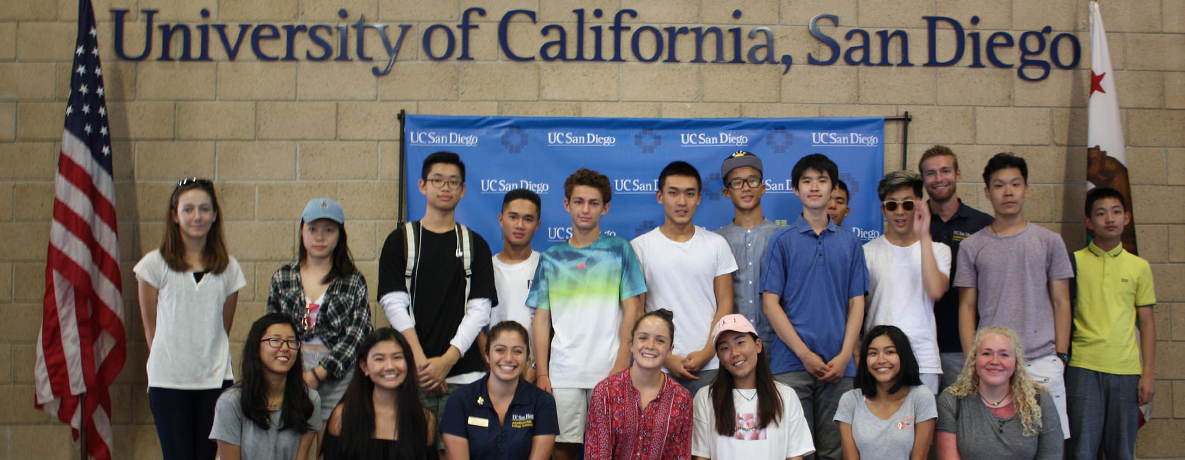Promoting U.S.-China Cooperation in Global Affairs
GPS’s 21st Century China Center, in partnership with the Global Leadership Institute, hosted high school students on campus for its annual U.S.-China Future Leaders Summer Program
Aug. 30, 2017 | By Elaine Wei | The Bishops School
The last Monday of UC San Diego’s three week-long U.S.-China Future Leaders Program ended with a series of team building exercises, led by the college students who acted as mediators in their discussion groups. As part of the annual U.S. China Future Leaders Summer Program, the 17 high school students from China and the United States sat in a circle, creating a web of compliments with a roll of streamers. They shared memories of their weekend, which included time at the beach, exploring San Diego’s Old Town district, and visiting the San Diego Zoo. The camaraderie between the students was evident, a connection that crossed country lines.
The program was created to do just that: build bonds between students from the world’s two superpowers and help them learn diplomatic skills. Started by Mrs. Kristen Druker and Professor Lei Guang, director of the 21st Century China Center at UC San Diego, the program utilizes Mrs. Druker’s Peace Conferencing Game, a student-led learning platform that she developed while teaching at the Bishop’s School. In this simulation, students roleplay as world leaders, such as Donald Trump and Jack Ma, and are split into three groups: Clean Energy, Artificial Intelligence, or Climate Change. They work together to identify and solve issues caused by their topics, which they then outline in their Action Plans. In this process, they are forced to unravel controversial issues, such as the Carbon Tax vs. Cap and Trade debate and the concern about Artificial Intelligence overtaking humans in EQ and IQ. On the last day of the program, they presented the solutions in their Action Plans to an audience of parents and industry experts, including Professor Susan Shirk,chair of the 21st Century China Center and a renowned expert on U.S.-China relations.
By tackling issues that are important to both China and the United States, the students created a multi-cultural dialogue that will continue to be pertinent to current and future global leaders. In today’s age of globalism, the students got an opportunity to literally walk in one another’s shoes. They also benefited from guest lectures by renowned UC San Diego faculty who spoke on U.S.-China relations, environment and climate change issues, and the ethics of artificial intelligence.
Outside the classroom, dorm life provided many opportunities for the students to bond. As Susanna Kim from Ventura, California said, “We all bonded together by living together. We got to know everyone’s habits [such as their] sleeping schedules.” From morning routines to their high school lives, students learned about each other’s cultural differences. While language barriers might have been present, students are able to communicate and work around it. At lunch, students ate together in large groups, chatting and sending funny videos and pictures of each other to the group’s WeChat. Students connected over shared interests, whether it be video games or extracurricular activities. For Gabriel Jinich of San Diego, California and Leo Li of Nanjing, China, their shared music taste forged a common bond and friendship between them. In the evenings, students spent their free time together in the common room, watching movies such as “The Great Wall” and “A.I.” and playing party games. According to Tristan Whang from San Diego, California these activities brought the group closer together.
Over the weekends, students were given the freedom to explore San Diego together, taking trips to the San Diego Zoo, Comic-Con, and Balboa Park, making memories along the way. Jasmin Lu from San Jose, California, recalls a time when she and three friends wandered around La Jolla Shores for forty minutes looking for an ice cream shop, laughing that they “weren’t allowed into one [ice cream shop] because [they] weren’t wearing shoes”.
On the last night, many of the students stayed awake the whole night, in order to say goodbye to those with early flights. Although it was difficult for some to stay awake, as Susanna remembers, they were all able say goodbye to each other with promises to keep in touch. At the end of the three weeks, the affection these students had for each other was tangible, with hopes to help facilitate better dialogue between the United States and China in the future.
Elaine Wei is a student at The Bishop’s School. We thank her for her outlook and write-up on the U.S.-China Future Leaders Program.

